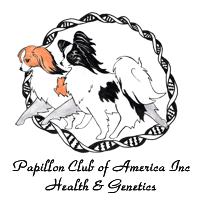GENETIC RESEARCH FUNDRAISING
Raising funds to sponsor research and educate Papillon lovers is an ongoing function of the Papillon Club of America’s Genetic Research Committee (GRC). Genetic research is a long-term project, and results are not expected to occur over night. However with persistence and continued funding it is our hope that the Papillon Club of America can advance the health and well being of our breed via research endeavors.
At the Papillon Club of America’s (PCA) 2012 National Specialty, Dr. Simon Petersen-Jones of Michigan State University (MSU) announced that his research team had identified the gene mutation for PRA1 in Papillons and developed a simple DNA test for people to use to test their breeding stock. Inceptions thru March 2015, 3400 Papillons worldwide have been DNA tested for PRA1. Owners of 541 of those have submitted their dog's results for publication on this Genetics website.
We continue to support Dr. Simon Petersen-Jones and his MSU research team in their continuing research for the second type of PRA (PRA2) and research for Juvenile Cataracts. Summer of 2015, Dr. Simon Petersen-Jones and his team submitted DNA for gene hunting to look for the gene mutation for PRA2. Dr. Simon Petersen-Jones reported that he did not have enough affected blood to find the mutated gene.
Dr. Simon Petersen-Jones has reported it really comes down to statistics. He is asking our help to find 20 affected PRA Papillon blood samples and blood from their first and second-generation family to make up approximately 100 samples to be sent to him. If he has that support, he will submit another genome study this year. However, the research does not stop there. He and his MSU team are ready to tackle another genetic disorder in Papillons: Juvenile Cataracts. He is also asking for the same amount of blood from affected and their first and second generation to start looking for that mutant gene as well. Some of you may receive phone calls from the PCA Genetics Committee members seeking such information and help with sending in blood samples.
Currently we have done a test breeding with two affected juvenile cataract Papillons to help with the research in juvenile cataracts. This test breeding was the request of Dr. Simon Petersen-Jones. This breeding has taken place and we had puppies born January 1, 2016. Elyse Vandermolen has whelped and hand raised this litter for the study. Thank you Elyse for your hard work. Thank you Sandy Vaillancourt and Eileen Hyde for putting me in touch with Pattie Boyst at PapAdopters in Michigan. We are happy to report that we have three permanent homes for the puppies! Thank You Pattie for the home visits and recommendations. The puppies, will be seeing Dr. Simon Petersen-Jones every three months for their eye exams and evaluations.
As you can see, the GRC is continually working for our beloved Papillons and we have had help from some amazing people with the same goal as us, to help our Papillons fly free of genetic diseases.
NAD (Neuroaxonal Dystrophy) presented its ugly head in 2008. Since then, we have had the help of Dr. Urs Giger at University Pennsylvania, School of Veterinary Medicine. He and his research team sent in DNA samples for a genome study to isolate and identify the specific mutation. Dr. Giger and his Team announced on October 3, 2015 that they had found the mutant gene for NAD. PennGen is currently the test lab for this NAD DNA gene testing.
The first 2016 quarter of NAD test results are now on the PCA website, and will be posted on a quarterly basis as for the results of the PRA1 gene.
Numerous projects are underway to generate research money.
Our Fundraising goal for the 2016 is $30,000.
We will be having auctions on our “PCA Health & Genetics Committee” Facebook page, sponsoring raffles and posting items for sale. Should you wish to contribute, or are the lucky winner of one of the bids on Facebook you now have the ability to pay online by credit card or PayPal.
Please know we appreciate all donations, and want to take this time to :
THANK YOU IN ADVANCE for your support.

While Papillons are generally a healthy breed, there are known genetic problems that affect
some individuals.
The goal of this Committee is to enlighten the breeding community and the general
public about the types of problems that can occur, in the hopes we can all work
together to reduce their incidence.
PCA Health & Genetic Committee
